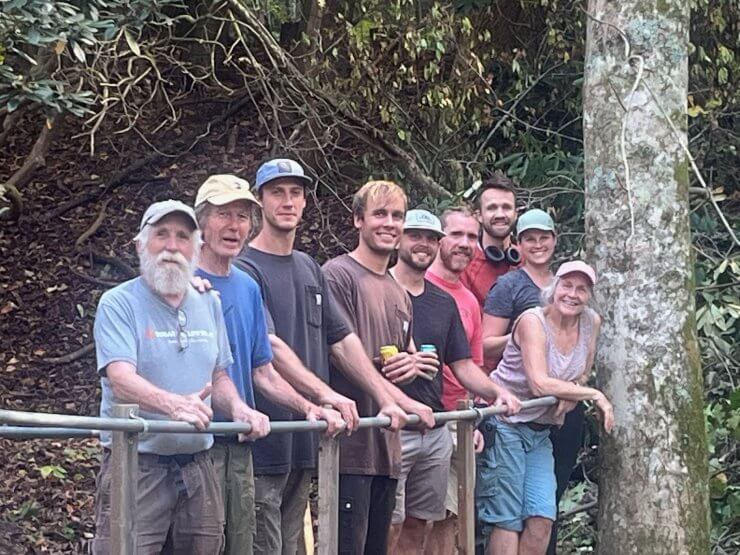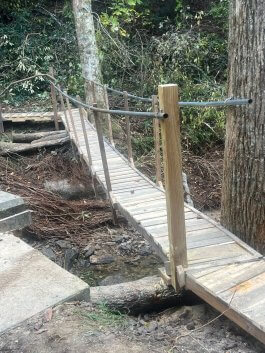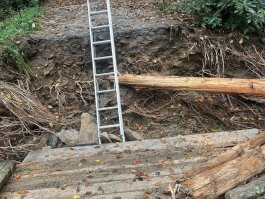Read by Michael Flamel

Last month in this column, I described our experience living in the area of Western North Carolina severely hit by Hurricane Helene [see “(almost) Ground Zero”]. Our part of Fairview wasn’t one of the most impacted sections—they were five to 15 crow-fly miles away. But we were smacked hard. Becky and I lost power, water, internet, and phone for weeks.
We could cope with that. We just camped out at home. And that part actually had a positive side effect: without our regular distractions of work and screens and the (impassable) outdoors, we were practically forced to spend time together, which we both enjoyed.
Also on the plus side, neighbors dropped by to visit. (Who does that anymore?) Far-away friends from Montana to Vermont reached out to check on us. Heck, after my initial piece ran here in GreenPrints, I even heard from my 60-years-ago, high-school girlfriend! The caring such contacts showed were very comforting.
So were all the efforts made by people near and far to help each other. It was only weeks before the November election, but nary a political word was heard. There were no Republicans or Democrats, just folks helping folks. One construction crew brought all their heavy equipment from Charlotte and repaired our neighborhood’s ruined road—for free.
Even after the other local roads were cleared and power restored, Becky and I still faced problems. The worst: the flood had broken the bridge that spanned the creek below our house. One side was intact; the other had dropped five feet.

Suddenly, three carpenter brothers from the opposite side of the state showed up. They built us a 32-foot-long footbridge so we could get to our home without climbing up a ladder! Its base was three sturdy locust trees that had fallen on a neighbor’s yard, topped by wooden pallets sawed in half and their gaps filled in. Two spans of metal conduit on each side serve as guardrails. Now we can walk from our house side to the road side and back in style, a good ten feet above the creek. A total of nine different people helped that day. Becky and I were deeply touched.
Still, we can’t drive up to our house. I’ve been trying to find someone to repair our bridge. The first two people who looked at it said they couldn’t handle it. (It’s going to be a tricky job.) The third fellow said he could do it, and then gave me an estimate that was—well, shocking. I am currently getting estimates from a couple of other contractors. I know it’s going to be costly; I pray we can afford it. (FEMA has offered some money, but not a lot.)
In the big picture, of course, a problem like that is not big. Did our home wash away? No. Did fallen trees destroy it? No. Did I watch my business wash away in the flood? No. Did I lose the most irreplaceable thing of all—family? No, no, no.

Really, the saddest thing for me is not dealing with the broken bridge, it’s seeing the broken landscape. Long lines of piled-up mattresses, sheetrock, and other trash line some streets like barricades. Whole business districts have been scoured away, trash and mud left behind.
And, oh, the woods. Our beautiful mountain woods. Trees block trails. Landslides strip slopes. Washouts make gullies out of footpaths. Acres of loose rubble line riversides. Massive tangles of trunks and roots look like grossly matted hair. It hurts to see it.
In time, nature’s garden will recover. Come Spring, new growth will emerge. It always has. It always will.
Those of us who love the outdoors are out there even now: chain sawing, shoveling, clipping, clearing, hauling. Being nature’s gardeners.
Which, friends, is what I’m heading off to do today, as soon as I type the last keystroke of this piece.
Trying to help heal the land.
And myself. ❖


 Previous
Previous



Great article.